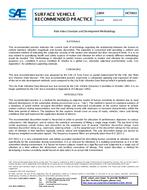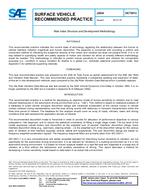Click here to purchase
This recommended practice defines methods for the measurement of periodic, random and transient whole-body vibration. It indicates the principal factors that combine to determine the degree to which a vibration exposure will cause discomfort. Informative appendices indicate the current state of knowledge and provide guidance on the possible effects of motion and vibration on discomfort. The frequency range considered is 0.5 Hz to 80 Hz. This recommended practice also defines the principles of preferred methods of mounting transducers for determining human exposure. This recommended practice is applicable to light passenger vehicles (e.g., passenger cars and light trucks). This recommended practice is applicable to motions transmitted to the human body as a whole through the buttocks, back and feet of a seated occupant, as well as through the hands of a driver. This recommended practice offers a method for developing a ride performance index but does not specifically describe how to apply this index to assessment or comparison of specific vehicles. NOTE:This recommended practice may also be applicable to other types of ground vehicles (e.g., medium and heavy duty road vehicles) with seated occupants having similar seating posture, occupant/vehicle interfaces, and vibration magnitudes, frequencies, and durations as light passenger vehicles.
Product Details
- Published:
- 10/22/2013
- File Size:
- 1 file , 520 KB

